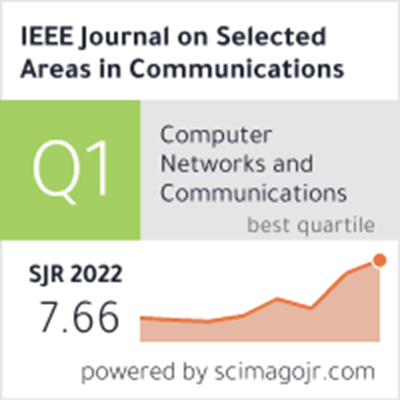Incentive Mechanism Design to Meet Task Criteria in Crowdsourcing: How to Determine Your Budget
IF 13.8
1区 计算机科学
Q1 ENGINEERING, ELECTRICAL & ELECTRONIC
IEEE Journal on Selected Areas in Communications
Pub Date : 2017-02-01
DOI:10.1109/JSAC.2017.2659278
引用次数: 24
Abstract
In crowdsourcing markets, a requester announces a task and calls for contribution from potential participants. With strategic participants, the requester needs to reward the participants to introduce the incentives of participation. However, it is natural to ask whether it is worth introducing incentives if the total payment for eliciting incentives is too high. This paper addresses such a fundamental concern by designing a frugal mechanism with minimum payment used to procure the total amount of service contributions demanded. We design two mechanisms to provide the incentives of participation while minimizing the payment used by the requester. We first propose a frugal auction-based mechanism, which stimulates participants to truthfully report their information. We theoretically prove that the payment used is not more than the optimal cost (with no incentive considered) plus a bounded additive. We then design a Stackelberg-game-based mechanism, in which the requester fixes a certain total payment at the very beginning so as to encourage the participants to compete for it and participate in the task. We verify the existence of a unique Nash equilibrium (NE) and develop a novel algorithm to find the NE, as well as the optimal payment to extract the NE. Our simulation results show that the payment used in these mechanisms is close to the optimal solution with no incentive considered, while the extra payment caused by introducing truthfulness in auction-based mechanism is about twice that of the NE in Stakelberg-game-based mechanism.满足众包任务标准的激励机制设计:如何确定预算
在众包市场中,请求者宣布一项任务,并要求潜在参与者做出贡献。对于战略性参与者,请求者需要奖励参与者,以引入参与的激励措施。然而,如果获得激励的总报酬太高,人们自然会问是否值得引入激励。本文通过设计一种节约机制来解决这一根本问题,该机制使用最低支付额来获取所需的服务缴款总额。我们设计了两种机制来提供参与的激励,同时最大限度地减少请求者使用的付款。我们首先提出了一种基于节俭拍卖的机制,激励参与者真实地报告他们的信息。我们从理论上证明了所使用的支付不超过最优成本(不考虑激励)加上有界添加剂。然后,我们设计了一个基于Stackelberg游戏的机制,在该机制中,请求者在一开始就固定一定的总付款,以鼓励参与者竞争并参与任务。我们验证了唯一纳什均衡(NE)的存在性,并开发了一种新的算法来寻找NE,以及提取NE的最优支付。我们的仿真结果表明,在不考虑激励的情况下,这些机制中使用的支付接近最优解,而在基于拍卖的机制中引入真实性所导致的额外支付大约是基于Stakelberg游戏机制中NE的两倍。
本文章由计算机程序翻译,如有差异,请以英文原文为准。
求助全文
约1分钟内获得全文
求助全文
来源期刊
CiteScore
30.00
自引率
4.30%
发文量
234
审稿时长
6 months
期刊介绍:
The IEEE Journal on Selected Areas in Communications (JSAC) is a prestigious journal that covers various topics related to Computer Networks and Communications (Q1) as well as Electrical and Electronic Engineering (Q1). Each issue of JSAC is dedicated to a specific technical topic, providing readers with an up-to-date collection of papers in that area. The journal is highly regarded within the research community and serves as a valuable reference.
The topics covered by JSAC issues span the entire field of communications and networking, with recent issue themes including Network Coding for Wireless Communication Networks, Wireless and Pervasive Communications for Healthcare, Network Infrastructure Configuration, Broadband Access Networks: Architectures and Protocols, Body Area Networking: Technology and Applications, Underwater Wireless Communication Networks, Game Theory in Communication Systems, and Exploiting Limited Feedback in Tomorrow’s Communication Networks.

 求助内容:
求助内容: 应助结果提醒方式:
应助结果提醒方式:


